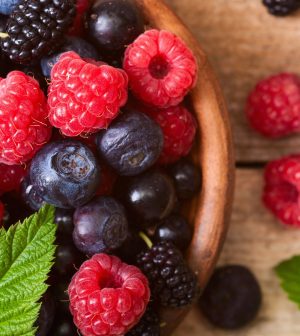- Could Your Grocery Store Meat Be Causing Recurring UTIs?
- Are You Making This Expensive Thermostat Error This Winter?
- Recognizing the Signs of Hypothyroidism
- 10 Strategies to Overcome Insomnia
- Could Artificial Sweeteners Be Aging the Brain Faster?
- Techniques for Soothing Your Nervous System
- Does the Water in Your House Smell Funny? Here’s Why
- Can a Daily Dose of Apple Cider Vinegar Actually Aid Weight Loss?
- 6 Health Beverages That Can Actually Spike Your Blood Sugar
- Treatment Options for Social Anxiety Disorder
An Apple (and Some Blackberries) Each Day May Keep Frailty Away

You’ve heard of eating your spinach to stay strong, but how about loading up on your flavonols?
New research suggests that plant-based foods rich in these important dietary compounds could lower your chances of developing frailty as you age.
Apples and blackberries are among the fruits that contain a particular flavonoid called quercetin that may be the most important to prevent frailty, the investigators added.
“There may be some validity to the old saying, an apple a day keeps the doctor [or frailty] away,” said a team that included Steven Oei, from the department of medicine at Beth Israel Deaconess Medical Center, in Boston. “Our findings suggest that for every 10 mg [milligrams] higher intake of flavonols per day, the odds of frailty were reduced by 20%. Individuals can easily consume 10 mg of flavonols intake per day since one medium-sized apple has about 10 mg of flavonols.”
About 10% to 15% of older adults experience frailty. This geriatric syndrome leads to a greater risk of falls, fractures, disability, hospitalization and death.
Dietary recommendations to prevent frailty typically focus on eating protein, but many other foods have health benefits, the study authors reported.
“Although there was no significant association between total flavonoid intake and frailty, higher flavonols intake (one of the subclasses of flavonoids) was associated with lower odds of developing frailty,” according to study co-authors Shivani Sahni and Courtney Millar, of the department of medicine at Beth Israel Deaconess Medical Center and the Hinda and Arthur Marcus Institute for Aging Research, Hebrew SeniorLife, in Boston.
“Specifically, higher quercetin intake was the flavonoid that had the strongest association with frailty prevention,” they explained in an institute news release.
Data came from the Framingham Heart Study and included just over 1,700 people. All had no frailty at baseline and were followed for about 12 years. After about 12 years, just over 13% of the participants developed frailty.
Future research should focus on dietary interventions of flavonols or quercetin for the treatment of frailty, the study team said. Research is also needed in racially and ethnically diverse participants, they recommended.
The findings were published May 23 in the American Journal of Clinical Nutrition.
More information
The American Heart Association has more on flavonoids.
SOURCE: Hinda and Arthur Marcus Institute for Aging Research, Hebrew SeniorLife, news release, May 23, 2023
Source: HealthDay
Copyright © 2026 HealthDay. All rights reserved.










